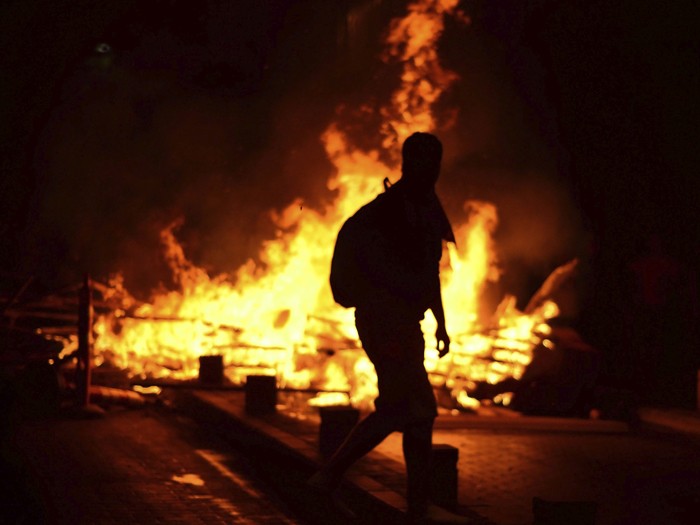Crisis Management
Dealing with Civil Unrest

Retailers and other companies across the country are looking for a Plan B in the wake of riots that destroyed stores in Ferguson, Mo. and now Baltimore.
Meanwhile, carriers might seek to recover their losses from damage and business disruption claims by suing cities that tell their police to stand down to give space to protesters who “wished to destroy.” What’s unknown at this point is whether carriers would prevail.
Companies need to develop contingency plans specific for each location to manage events such as riots, as well as situations that could lead to them and the resulting consequences, said Sean Ahrens, security consulting services practice leader for Aon Global Risk Consulting in Chicago.
A key part of such planning includes determining under what circumstances onsite managers or a crisis management team should close retail locations.
“Now is also the time to review contingency plans to understand what other locations can be used during a time of unrest, as well as making sure companies that supply goods to them have alternative ways to make their goods available.” — Lance Becker, vice chairman, Northeast region, Arthur J. Gallagher & Co.
“Organizations that have robust plans and contingencies may actually have shelter in place to protect employees during civil unrest,” Ahrens said.
“But if a company has no policies or procedures in place, then in the worst case scenario, they should close the store and evacuate. Ultimately, a company’s duty of care is to protect their employees from all hazards.”
Post-event, companies should also provide counseling for employees who were caught up in a riot, though a lot of them might not want to come back, he said.
Tracy Knippenburg Gillis, global reputational risk and crisis management leader for Marsh Risk Consulting in New York City, said there are a lot of factors that determine when to close a facility, such as whether it serves a critical function in the community, or whether employees would lose needed income if the store closed prematurely during peaceful protests.
“Most organizations should have their crisis management teams on alert, if not actively engaged, monitoring and potentially making decisions on delayed openings or closures over the course of events,” Gillis said.
“They should be communicating to employees what they are doing and ideally monitoring what authorities are doing, so they can make the right judgment at the right time.”
Marsh has several clients in retail, hospitality and other entertainment-related industries that were impacted in last month’s Baltimore riots. Several suffered business disruptions due to curfews imposed by the city, said Bob O’Brien, a managing director in Marsh’s national claims practice in Washington, D.C.
“Companies should practice situational awareness,” O’Brien said.
“They have to go through several steps continuously, identifying exposures to the company and their supply chain. They should be aware of what’s going on all around them that could potentially impact them if they are caught up in a freeze zone or a closure zone.”
Companies should also review their insurance coverage to make sure they have the proper terms, limits and retention, he said. After an event, they should apply all possible triggers that could impact a claim, whether direct damage or civil authority that results in service interruption and ingress/egress issues.
Companies should make sure to secure documents to better ensure payment of their claims, he said.
Arthur J. Gallagher & Co. also had clients that suffered losses and filed claims as a result of the upheaval in Baltimore, said Lance Becker, vice chairman, Northeast region in New York City.
Becker said the recent riots that impacted area businesses serve as “an education” for companies to make sure their insurance policies cover “civil authority and unrest,” which would pay for either physical damage or losses for not being able to gain entry to the store.
“Now is also the time to review contingency plans to understand what other locations can be used during a times of unrest, as well as making sure companies that supply goods to them have alternative ways to make their good available,” he said.
Carriers might seek to recoup their losses by suing Baltimore, as several news outlets have reported that the police there were ordered to “stand down” and not prevent rioters from looting, burning or destroying stores, including a CVS pharmacy and an Ace Cash Express store.
Baltimore Mayor Stephanie Rawlings-Blake denied there was a stand down order, and she also told “Meet the Press” last Sunday that she regretted saying in an earlier press conference that space was given to protesters who “wished to destroy.”
Terrence Graves, a shareholder at Sands Anderson PC law firm in Richmond, Va., said that any city that experiences civil unrest might have sovereign immunity for those sorts of actions dealing with the police force.
“If a city government — like any other governmental entity — takes action within what is considered its governmental sphere, such as making political decisions, as opposed to its proprietary sphere such as providing water services or maintaining city streets, then a city might have governmental immunity,” Graves said.
“There is an interesting test that most courts would run though in order to determine whether the city was acting as a government or as a landlord.”








